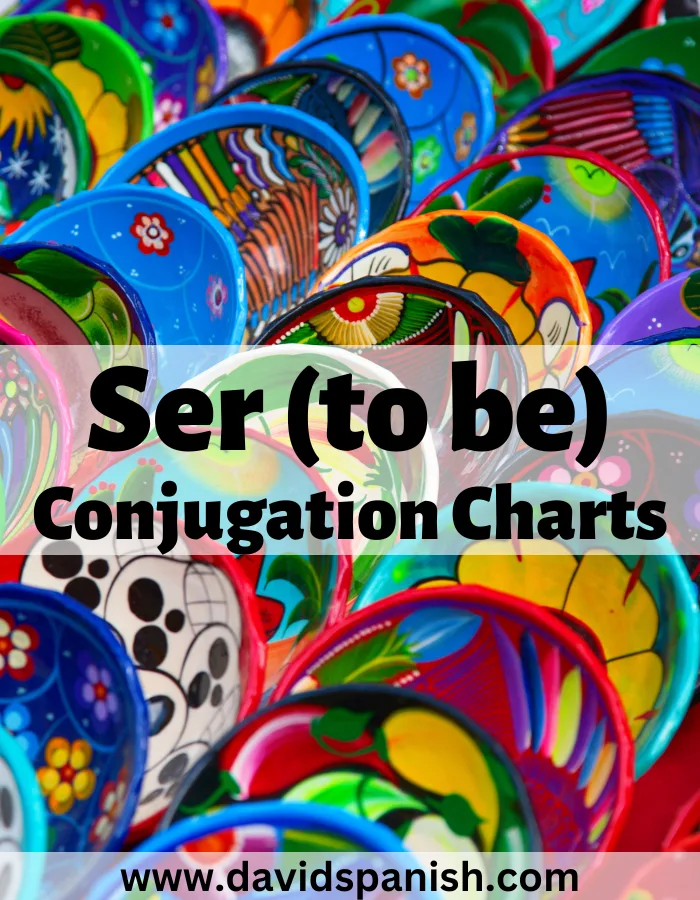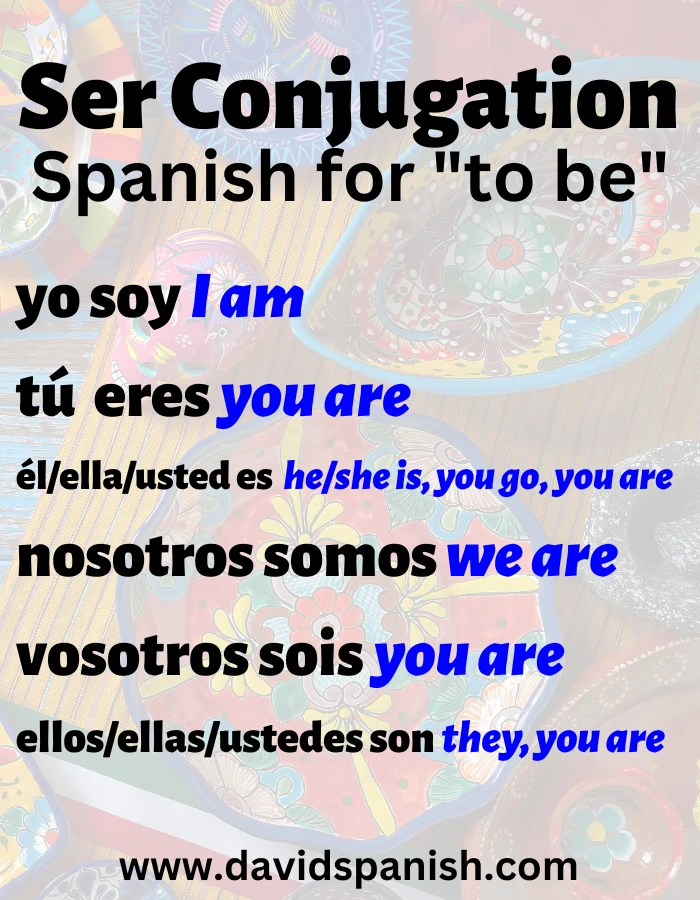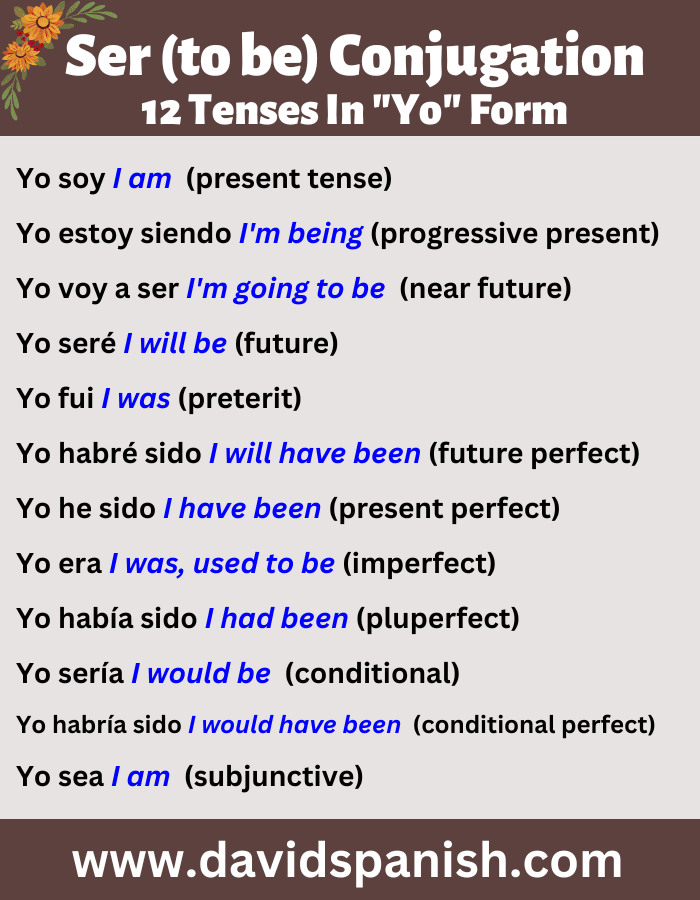The Spanish verb ser means “to be” and is an essential verb for all beginner students. The conjugation of ser in the present tense is: Yo soy (I am), tú eres (you are), él/ella/usted es (he, she is; you are), nosotros somos (we are), vosotros sois (you are) and ellos/ellas/usted son (they, you are).

Ser is an irregular ER verb. This means that both its stem and endings when conjugated in the present tense are different than other regular ER verbs. This page on our site covers Spanish ER verbs in detail.

In Spanish, there are two verbs for “to be”: ser and estar. The language uses ser to describe qualities which can be assumed to be permanent, such as relationships between people, nationalities, religions, profession, physical traits, etc.
The verb estar is used to describe temporary states, such as location and emotions. This page on our site covers the differences between ser vs. estar in detail. The page also covers the many usages of ser in detail.
This page on our site covers estar conjugation charts in detail and provides many example sentences.
On this page we provide conjugation charts for ser in ten major verb tenses.
- Present tense (presente de indicativo)
- Progressive present (presente progresivo)
- Near future (futuro inmediato)
- Future tense (futuro)
- Preterite (pretérito)
- Present perfect indicative (perfecto de indicativo)
- Imperfect (imperfecto de indicativo)
- Conditional (potential simple)
- Present subjunctive (presente de subjuntivo)
- Imperative mood (imperativo)
Ser conjugation table

Forms of ser at a glance
The following graphic covers the verb ser in twelve tenses in the first-person singular (yo) form.

Ser conjugation charts
Present tense (presente de indicativo)
In the present tense, yo soy translates to “I am”. As mentioned above, Spanish uses ser for nationalities, professions, religions and physical characteristics.
| yo soy | I am | Yo soy mexicano. | I am Mexican. |
| tú eres | you are | Tú eres mi amigo. | You are my friend. |
| él/alla, usted es | he/she is, you are | Ella es española. | She is Spanish. |
| nosotros somos | we are | Nosotros somos médicos. | We are doctors. |
| vosotros sois | you are | Vosotros sois cristianos. | You are Christian. |
| ellos/ellas, ustedes son | they/you are | Ellos son rubios. | They are blond. |
The following graphic covers ser in the first-person singular (yo) form for twelve verb tenses.
Progressive present (presente progresivo)
The progressive present combines the present tense of estar (also to be) with the present participle. Yo estoy siendo translates to “I am being”.
| yo estoy siendo | I am being | Yo estoy siendo sincero. | I am being sincere. |
| tú estás siendo | you are being | Tú estás siendo fiel. | You are being faithful. |
| él/ella, usted está siendo | he/she is being; you are being | Él está siendo justo. | He is being fair. |
| nosotros estamos siendo | we are being | Nosotros estamos siendo impulsivos. | We are being impulsive. |
| vosotros estáis siendo | you are being | Vosotros estáis siendo bobos. | You are being silly. |
| ellos/ellas, ustedes están siendo | they/you are being | Ellos están siendo simpáticos. | They are being nice., |
Near future (futuro inmediato)
The near future tense uses the following construction: Present tense of ir (to be) + preposition a + infinitive. Yo voy a ser translates to “I am going to be”.
| yo voy a ser | I'm going to be | Yo voy a ser un millonario. | I'm going to be a millionaire. |
| tú vas a ser | you're going to be | Tú vas a ser mi esposa. | You're going to be my wife. |
| él/ella, usted va a ser | he/she is going to be; you are going to be | Él va a ser un buen empleado. | He's going to be a good employee. |
| nosotros vamos a ser | we're going to be | Vamos a ser honestos. | We're going to be honest. |
| vosotros vais a ser | you're going to be | Vosotros vais a ser puntuales. | You're going to be on time. |
| ellos/ellas, ustedes van a ser | they/you're going to be | Ellos van a ser orgullosos. | They're going to be proud. |
Future tense (futuro)
In the future tense, yo seré translates to “I will be”.
| yo seré | I will be | Yo seré tu amigo. | I will be your friend. |
| tú serás | you will be | Tú serás un buen empleado. | You will be a good employee. |
| él/ella, usted será | he/she/you will be | Ella será nuestra jefa. | She will be our boss. |
| nosotros seremos | we will be | Nosotros seremos sus colegas. | We will be your colleagues. |
| vosotros seréis | you will be | Vosotros seréis nuestros ayudantes. | You will be our helpers. |
| ellos/ellas, ustedes serán | they/you will be | Ellos serán los voluntario. | They will be the volunteers. |
Preterite (pretérito)
The preterite is a commonly used past tense used to express past events which occurred at defined times. Yo fui translates to “I was”.
| yo fui | I was | Yo fui vendedor de zapatos. | I was a shoes salesman. |
| tú fuiste | you were | Tú fuiste el director. | You were the manager. |
| él/ella, usted fue | He/she was; you were | Él fue el jefe de la empresa. | He was the company's boss. |
| nosotros fuimos | we were | Nosotros fuimos amigos íntimos. | We were good friends. |
| vosotros fuisteis | you were | Vosotros fuisteis en España un vez. | You were in Spain once. |
| ellos/ellas, ustedes fueron | they/you were | Ellos fueron juntos durante cinq años. | They were together for five years. |
Present perfect indicative (perfecto de indicativo)
The present perfect indicative tense combines the present tense of haber (to have) with the past participle. The present perfect is used to describe past actions which have a bearing on the present. Yo he sido translates to “I have been”.
| yo he sido | I have been | Yo he sido un buen estudiante. | I have been a good student. |
| tú has sido | You have been | Tú has sido mi amigo desde hace muchos años. | You've been my friend for many years. |
| él/ella, usted ha sido | He/she has been; you have been | Él ha side un modelo a seguir por todos. | He has been a role model for everybody. |
| nosotros hemos sido | We have been | Nosotros hemos sido competidor en el mismo sector. | We've been competitors in the same industry. |
| vosotros habéis sido | You have been | Vosotros habéis sido un poco provocadores. | You've been a bit provocative. |
| ellos/ellas, ustedes han sido | They/you have been | Ellos han sido muy generosos con los recién llegados. | They've been very generous with the newcomers. |
Imperfect (imperfecto de indicativo)
The imperfect tense is used to express past actions which used to happen over time. Yo era translates to “I was” and “I used to be”.
| yo era | I was, used to be | Cuando era niño, esquiaba con mi hermana. | When I was a child I used to ski with my sister. |
| tú eras | you were, used to be | Tú eras un chico muy chistoso. | You were a very funny boy. |
| él/ella, usted era | he/she was, used to be; you were, used to be | Ella era una estudiante muy inteligente. | She was a very intelligent student. |
| nosotros éramos | we were, used to be | Nosotros éramos colegas en la misma empresa. | We used to be coworkers in the same company. |
| vosotros erais | you were, used to be | Vosotros erais compañero de clase en la secundaria. | You were classmates in middle school. |
| ellos/ellas, ustedes | they/you were, used to be | Ellos eran vecino en el barrio antiguo. | They were neighbors in the old neighborhood. |
Conditional (potential simple)
The conditional is used to express hypothetical actions. Yo sería translates to “I would be’.
| yo sería | I would be | Yo sería profesor si fuera más inteligente. | I'd be a teacher if I were smarter. |
| tú serías | you would be | Tú serías papá si tuvieras una esposa. | You'd be a dad if you had a wife. |
| él/ella, usted sería | he/she/you would be | Él sería rico si fuera más laborioso. | He's be rich if he were more industrious. |
| nosotros seríamos | we would be | Nosotros seríamos más felices si viviéramos al campo. | We'd be happier if we lived in the countryside. |
| vosotros seríais | you would be | Vosotros seríais en forma si hicierais más ejercicio. | You'd be in shape if you exercised more. |
| ellos/ellas, ustedes | they/you would be | Ellos serían dispuesto si tuvieran un poco más tiempo. | They'd be ready if they had a bit more time. |
Present subjunctive (presente de subjuntivo)
The subjunctive mood is used for expressing wishes, emotions and doubts. Yo sea translates to “I am” or “I be”.
| yo sea | I am | Es importante que sea muy atento. | It's important that I be very vigilant. |
| tú seas | you are | Queremos que seas más responsable. | We want you to be more accountable. |
| él, ella, usted sea | He/she is; you are | Es posible que él sea la persona adecuada. | It's possible that he might be the right person. |
| nosotros seamos | we are | Él quiere que seamos listos en una hora. | He wants us to be ready in one hour. |
| vosotros seáis | you are | Necesito vosotros seáis más atentos. | I need you to be more attentive. |
| ellos/ellas, ustedes sean | they/you are | Estoy feliz que ellos sean tanto dispuestos a ayudar. | I'm happy they're so willing to help. |
Imperative (imperativo)
The imperative mood is used for giving commands and strong suggestions. The following chart only shows the conjugation of ser in the imperative. We’ve included sample sentences below chart.
| Affirmative Command | Negative Command | |||
| tú | ¡sé! | Be! | ¡no seas! | Don't be! |
| usted | ¡sea! | Be! | ¡no sea! | Don't be! |
| nosotros | ¡seamos! | Let's be! | ¡no seamos! | Let's not be! |
| vosotros | ¡sed! | Be! | ¡no seáis! | Don't be! |
| ustedes | ¡sean! | Be! | ¡no sean! | Don't be! |
Examples:
- ¡Sé paciente! Be patient!
- ¡No seas celoso! Don’t be jealous!
- ¡Seamos cuidadoso! Let’s be careful!
- ¡no sean estúpidos! Don’t be stupid!
Discover more:
- Ir (to go) conjugation tables
- Tener (to have) conjugation tables
- Hablar (to speak) conjugation tables
- La Bamba Meaning, Spanish Lyrics & English Translation - May 4, 2024
- Bésame Mucho Meaning, Spanish Lyrics & English Translation - May 3, 2024
- Querida – Lyrics, Meaning & Translation - May 2, 2024
